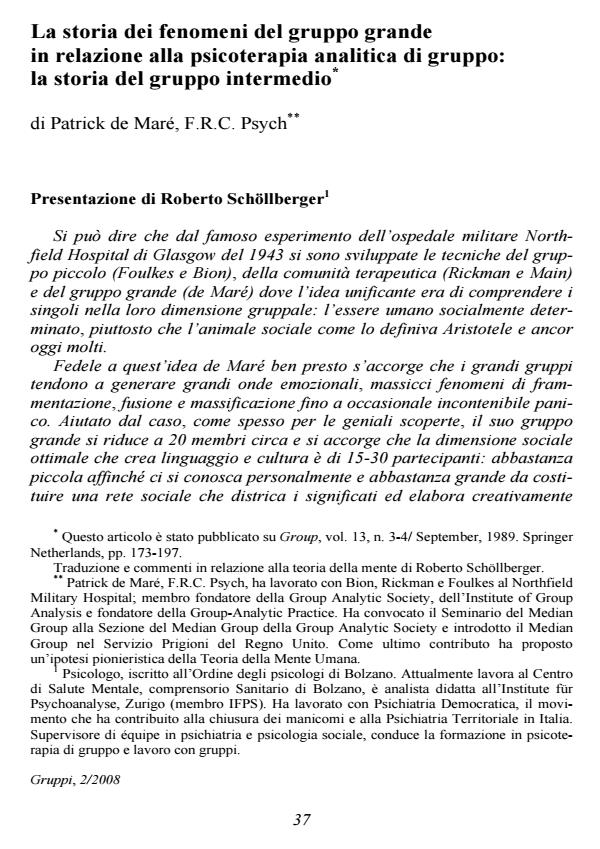La storia dei fenomeni del gruppo grande in relazione alla psicoterapia analitica di gruppo: la storia del gruppo intermedio
Titolo Rivista GRUPPI
Autori/Curatori Patrick de Maré, F.R.C. Psych
Anno di pubblicazione 2009 Fascicolo 2008/2 Lingua Italiano
Numero pagine 36 P. 37-72 Dimensione file 329 KB
DOI
Il DOI è il codice a barre della proprietà intellettuale: per saperne di più
clicca qui
Qui sotto puoi vedere in anteprima la prima pagina di questo articolo.
Se questo articolo ti interessa, lo puoi acquistare (e scaricare in formato pdf) seguendo le facili indicazioni per acquistare il download credit. Acquista Download Credits per scaricare questo Articolo in formato PDF

FrancoAngeli è membro della Publishers International Linking Association, Inc (PILA)associazione indipendente e non profit per facilitare (attraverso i servizi tecnologici implementati da CrossRef.org) l’accesso degli studiosi ai contenuti digitali nelle pubblicazioni professionali e scientifiche
The history of large group phenomena in relation to group analytic psychotherapy: thestory of the Median Group - This paper presents a history of the large group approach in relation to Foulkesian groupanalytic psychotherapy, including the nature of this approach in relation to Foulkesian principles.Much of the theory reflects Foulkes’s attitude, but there are also clear distinctionsmade, notably a new stance in our thinking about groups as a result of the increase in size(i.e., a membership of about 20), the introduction of the cultural dimension which this increaseentails, and the question of what happens after the resolution of Kleinian, oedipal andfamilial conflicts has been achieved in psychoanalysis and small groups, no-tably what happensonce exile has been achieved. The approach presented proposes to handle the frustrationand hate that these conflicts engender in the form of negative or antilibidinal energies,and their transformation into psychic energy, through dialogue leading from hate to the establishmentof koinonia, or impersonal fellowship, and of microcultural influences whichpromote rather than inhibit communication. Being neither small nor large, a group of about20 members has become known as a median group. Key words: Median Group, exile, koinonia.;
Patrick de Maré, F.R.C. Psych, La storia dei fenomeni del gruppo grande in relazione alla psicoterapia analitica di gruppo: la storia del gruppo intermedio in "GRUPPI" 2/2008, pp 37-72, DOI: